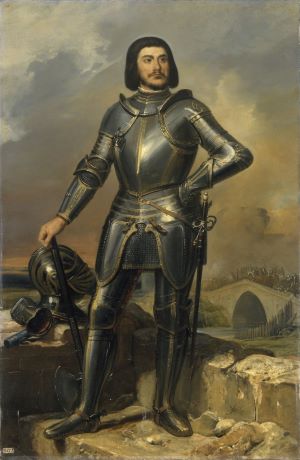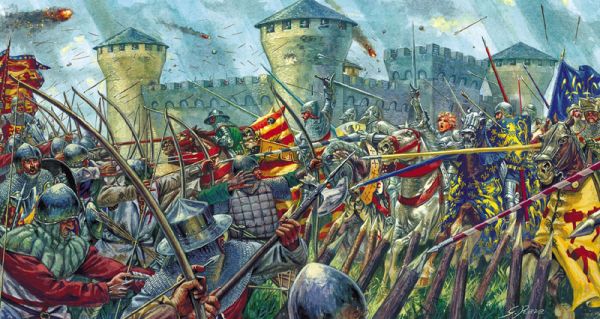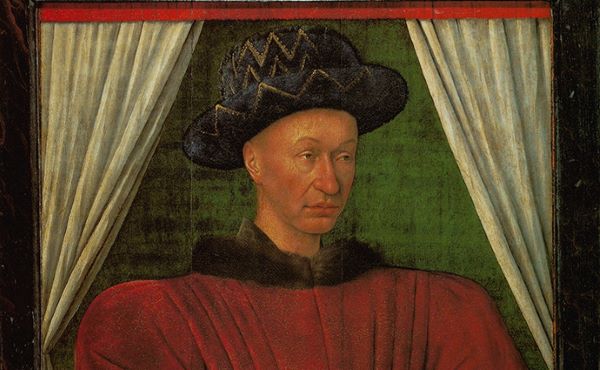Trial of Gilles Rais: A Chronology

September 10, 1404
Gilles de Rais is born in the castle at Champtoce, on the banks of the Loire.
1415 (early)
Marie de Craon, Gilles’ mother, dies.
September 28, 1415
Guy de Laval, Gilles’ father, dies. Gilles de Rais is raised from this time by his maternal grandfather, Jean de Craon.
April 24, 1422
Gilles is marries his cousin, Catherine de Thouars.
1424
At age 20, Gilles becomes the administrator of his property, no longer needing to consult his grandfather as to its use.
1427
Gilles military career begins. He participates in the first of what will be several battles on the side of the French against the English.
April 1429
Gilles de Rais, and his personal army, join Joan of Arc and 10,000 to 12,000 men on a march to Orleans to liberate the city from the English.
May 7, 1429
Fighting alongside Joan of Arc, Gilles participates in the decisive Battle of Tourelles, in which the English are routed. The siege of Orleans is lifted the following day.

Battle for Orleans
July 17, 1429
Charles VII is consecrated as King of France at the Reims cathedral in a ceremony attended by both Joan of Arc and Gilles de Rais. Rais is made Marshal of France.
September 8, 1429
Joan of Arc and Gilles de Rais lead an assault on the walls of Paris. Joan of Arc is wounded, shot through her thigh by a crossbow.
1429 (late)
Gilles’ daughter, Marie, is born at Champtoce.
May 30, 1431
After being captured and tried by the English, Joan of Arc is burned at the stake at Rouen.
November 15, 1432
Jean de Craon, Gilles’ grandfather who raised him, dies. Gilles begins to spend even more extravagantly than before. Sometime after his grandfather’s death (exactly when is not known), Gilles begins murdering children.
1432 (late)
Pat age 15, Poitu, who had been Gilles’ page, become his “child valet.”
1433 (early)
Child abductions and murders have almost certainly begun.
March 26, 1435
Gilles endows the Holy innocents Chapel at Machecoul.
May 1435
Gilles de Rais returns to Orleans for a celebration of the city’s liberation. Gilles racks up enormous expenditures, putting on plays and providing spectators with wine and fine food. Soon afterwards, Gilles begins selling property (including castles, wagons, and horses) to cover his tremendous expenses.
July 2, 1435
Worried by Gilles’ extravagant spending, Gilles’ brother and cousin obtains letters of interdict from Charles VII that prohibit Gilles from selling properties or entering into contracts.

King Charles VII
May 1436
Following an argument of some sort, Gilles abducts and imprisons a priest, Michel de Fontenay, who had been one of his childhood teachers. After protests from the Bishop, he frees the priest.
1437 (early)
Poitu becomes Gilles’ valet. (According to Poitu’s later confession, he had been having sexual intercourse with Gilles since he entered his service.) About this time, Poitu becomes aware of Gilles’ practice of murdering children and swears to keep his secrets. He becomes one of Gilles’ main procurers of child victims. Later in the year, Henriet Griart, Gilles’ other valet, will also learn of the murders and sex and then becomes an accomplice in the crimes.
October 1437
Gilles fears an attack on Machecoul castle. He asks Rene de La Suze and Robin Romulart to gather the bones of small children from a castle tower and burn them. They, however, miss two skeletons, which are discovered after Machecoul is taken and begin to arouse suspicions about Gilles.
June 1438
Having sold Champtoce castle to Jean V, but before he loses possession of it, Gilles has five of his manservants go to the tower and remove some forty skeletons of children. They are removed and burned.
1438 (summer to fall)
Children continue to disappear when Gilles de Rais is nearby (and become murder victims). Later testimony will relate the disappearances of the son of Jean Jenvret (age 9), the son of Jeanne Degrepie (age 12), the son of Jean Hubert (age 14), the son of Jean Fougere (age 12), the son of Peronne Loessart (age 10), the son of Jean Bernard (age 12), and the son of Eonnet Dagaye (age 10).
May 14, 1439
The conjurer Francois Prelati, from Italy, arrives at Gilles’ castle at Tiffauges.
1439 (summer to fall)
Under the direction of Prelati, Gilles makes ten to twelve attempts to summon the Devil/demons. He later reports he did not actually see the Devil, but believed others in his company did.
1439
Children continue to disappear, most presumably murdered by Gilles de Rais and his accomplices.
November 2, 1439
Charles VII issues a historically importance ordinance aimed at ending “the excesses and pillages” of feudal life. The ordinance establishes a regular army to replace the bands of men-at-arms in service of various lords. Some go so far as to call the ordinance “the birth of the modern world.”
December 1439
Persistent rumors spread that Gilles de Rais is behind the disappearance of dozens of children, and that he has likely murdered them.
December 1439
Gilles prepares an offering of a child’s heart and hand in the hopes that it will attract the Devil.
May 15, 1440
Gilles de Rais leads a band of about 40 armed men to the church of Saint-Etienne-de-Memorte. They rush the church and seize cleric Jean Le Ferron, the brother of the man to whom Gilles had sold his estate of Sainte-Etienne-de-Memorte. Gilles imprisons the cleric. This rash act turns influential people against Gilles and all but ensures he will be put on trial.
July 29, 1440
The Bishop of Nantes and Chancellor of Brittany, Jean de Malestroit, publishes the results of his secret inquest into the disappearance of children and suspicions about the involvement of Gilles de Rais.
August 15, 1440
The last child to become a victim of Gilles de Rais is murdered. He is the son of Eonnet de Villeblanche.
August 24, 1440
Gilles’ castle at Tiffauges is seized at the urging of the Duke of Britanny and the prisoner held by Gilles, Jean Le Ferron, is freed.
September 13, 1440
An ecclesiastical tribunal in Nantes indicts Gilles for murder, sodomy, violation of ecclesiastical immunity, and heresy.
September 15, 1440
Gilles is arrested (along with Francois Prelati, Eustache Blanchet, Henriet, and Poitu) and place in prison in Nantes.
September 16 or 17, 1440
Gilles appears before the secular court in Nantes to answer charges relating to the murders of multiple children and the seizure and imprisonment of cleric Jean Le Ferron.
September 18, 1440
Jean de Touscheronde, presiding at the secular inquest, calls the first of many witnesses who will describe children disappearing after being seen with Gilles, his valets, his procurers, or others in his employ. Witnesses will continue to appear through October 8.
September 19, 1440
The ecclesiastical trial of Gilles de Rais opens at Nantes.
September 28, 1440
Ten plaintiffs, having accused Gilles de Rais of abused and massacred their sons or nephews, appear before the ecclesiastical court.
October 8, 1440
The ecclesiastical trial begins in earnest with Gilles de Rais appearing before the Bishop and Vicar of the Inquisition. Gilles objects to his judges and refuses to take an oath.
October 13, 1440
The prosecutor in the ecclesiastical trial reads the bill of indictments, consisting of 49 articles. The bill covers the abuse and murder of children, the violation of ecclesiastical immunity of the seized cleric Jean Le Ferron, and heresy (essentially the invocation of demons). The articles allege that Gilles and his accomplices killed and tortured 140 children. The prosecutor asks that Gilles be excommunicated and made subject to other lawful punishments. Gilles again insults and denies the authority of the judges and, as a result, is excommunicated.
October 15, 1440
Gilles, in a U-turn, accepts the authority of his judges and apologizes for insulting them. He admits to having committed grievous crimes, but denies the invocation of demons.
October 16, 1440
The ecclesiastical court hears testimony from Francois Prelati, alchemist and conjuror for Gilles.
October 17, 1440
Gilles’ two valets, Henriet Griart and Poitu (Etienne Corillaut), as well as his priest, Eustache Blanchet, offer damning testimony in the ecclesiastical trial linking Gilles to multiple child murders and torture.
October 19, 1440
In the ecclesiastical trial, 15 witnesses offer testimony concerning the charges made against Gilles.
October 20, 1440
Gilles refuses to respond the charges in the indictment and is threatened with torture.
October 21, 1440
On the day Gilles de Rais is scheduled to be tortured, Gilles announces that he will submit to a full interrogation out of court. This becomes his first full confession. A report of his confession is submitted by the interrogating commissioners to the judges of the ecclesiastical court.
October 22, 1440
Gilles offers an emotional confession directly to the judges of the ecclesiastical court where he admits to specific murders and horrific acts such as choosing and kissing the most beautiful of the severed heads of the children he murdered. He blames his crimes on the idleness of his youth and excessive drinking.
October 23, 1440
After hearing the confession of Gilles’ two valets, Poitu and Henriet, the secular court condemns both men to death.
October 25, 1440
Gilles de Rais is found guilty in his ecclesiastical trial of the invocation of demons and committing sodomy on children. He is excommunicated and made subject to other lawful punishments. He asks to make a private confession and is reincorporated into the church. He is then transferred to the castle of Bouffay and put before a secular court, where he confesses to seizing and imprisoning the cleric Jean Le Ferron. For that and is other crimes, including the murder of many children, Gilles is sentenced to be hanged the next day.
October 26, 1440
Gilles de Rais, along with his valets Poitu and Henriet, are hanged in a meadow outside Nantes. Gilles remains are placed in a tomb in the church of Notre-Dame-de Carmel of Nantes.
